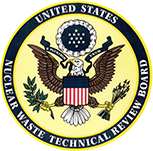 Dr. Scott W. Tyler was appointed to the U.S. Nuclear Waste Technical Review Board by President Joseph Biden on October 25, 2022.
Dr. Scott W. Tyler was appointed to the U.S. Nuclear Waste Technical Review Board by President Joseph Biden on October 25, 2022.
Dr. Tyler is professor emeritus in the Department of Geological Sciences and Engineering at the University of Nevada, Reno. He is also co-director of the National Science Foundation (NSF)-supported Center for transformative Environmental Monitoring Programs Community User Facility focusing on the development and application of fiber-optic based sensing of environmental temperature and strain. His research spans the atmospheric boundary layer, through the vadose zone and into the deep groundwater.
With training in mechanical engineering and hydrogeology, he has extensive experience in the fate and transport of high- and low-level commercial and defense-related radioactive waste in the subsurface, in both fractured rock and soils. His early work in radionuclide transport ranged from pore-scale analysis of water and solute transport in soils to reconstruction of modern and paleo-groundwater recharge through the thick unsaturated zones at the Nevada Test Site, related to radionuclide migration from nuclear weapons testing and from low-level waste disposal. He has also studied deep groundwater circulation beneath saline lakes, pore scale modeling of root/soil interactions, evaporation and transpiration in hyper-arid regions of the world, and processes of convection in groundwater systems. His recent work focuses on the measurement of the dynamics and thermal evolution of Antarctic ice shelves and the ocean waters below. As part of the NSF-supported International Thwaites Glacier Collaboration project, he has designed and developed fiber-optic moorings on the Thwaites Glacier to monitor temperature in both the floating ice shelf and the underlying ocean that has been operating at Thwaites since 2020.
Tyler has published ~ 130 peer -reviewed journal articles and book chapters in the fields of hydrology and hydrogeology. He is a fellow of the American Geophysical Union, the Geological Society of American and the Soil Science Society of America. He holds degrees in Mechanical Engineering from the University of Connecticut and Hydrogeology from the New Mexico Institute of Mining and Technology and the University of Nevada Reno. He is a member of the University of Connecticut's Academy of distinguished Engineers and has served as chair of the Hydrogeology Division of the Geologic Society of America and President of the Hydrology Section of the American Geophysical Union.
